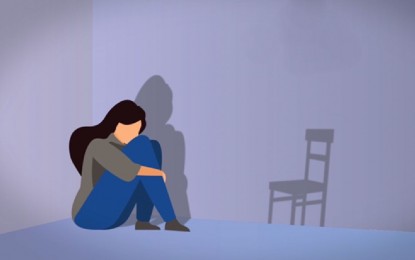
MANILA – As the government continues to battle the coronavirus disease (Covid-19), many people are also grappling with the effects of the pandemic on their lives.
However, the impact of the health crisis is more than anything that meets the eye -- an unseen pain which takes a toll on the minds of those reeling from the situation, especially the youth.
In the Philippines, reports have noted that the country presently has around merely 5,000 mental health experts, woefully inadequate for a population of more than 100 million.
Being aware of this problem, a school teacher in Sorsogon said conscious efforts involving community intervention can help manage the growing number of mental health problems, particularly among the youth at home amid these trying times.
Joseph Advincula from Donsol, Sorsogon called his proposal "Bantay Kabataan KAUSAP program". Kausap, which literally means somebody to talk to in Filipino stands for 'Kamustahin, Umakay, Samahan at Pagbutihin' aimed at checking on what the young people are up to, mentor them, accompany them and help improve their lives, especially those experiencing depression and other mental health problems.
"Among the youth, mental health problems arise, from among other factors, exposure to social media, a change in the lifestyle, and a lack of support and understanding from the family and community," he said in an interview Friday.
This was proven in a 2012 study by David D. Luxton, Jennifer D. June, and Jonathan M. Fairall published in the United States' American Journal of Public Health which noted "increasing evidence that the internet and social media can influence suicide-related behavior".
For one, the study notes that actual methods of suicide seem to have become more available online most from pro-suicide websites. The study also noted incidents of cyber-bullying and cyber harassment.
Cyberbullying, when directly or indirectly linked to suicide, has been called "cyberbullicide".
The rise of so-called "suicide pacts" among youth has also been noted.
The study said social media may also pose a hazard to vulnerable people through the influence of what the study called "extreme communities" or online groups that promote and provide support for beliefs and behaviors normally unacceptable in society such as eating disorders, suicide, and other forms of self-harm.

As a countermeasure, Advincula's advocacy, which started last year, draws largely on his exposure to young people.
He added that his program advocates greater involvement by communities to inquire about the condition of the youth, guide, direct, and lead them, conduct and accompany them and make them better and improve and emphasized the need to ingrain the value of oneself and life in general.
Advincula also suggests activities such as moral and spiritual seminars, personality development seminars, involvement in different religious /civic groups, talents, and skills training such as Zumba, family counseling activities, and environmental activities to engage children.
Even before the Covid-19 pandemic which has ravaged economies and lives throughout the world, suicide incidents have been a cause of concern around the world.
According to the World Health Organization (WHO), nearly 800,000 people die due to suicide every year, or one person every 40 seconds.
"There are indications that for each adult who died by suicide there may have been more than 20 others attempting suicide," WHO said in its website.
In 2016, self-harm was the second leading cause of death globally in young people between 10 to 29 years old with 222,093 incidents. According to WHO's global health estimates for that year more male youth commit suicide than females.
The WHO pointed out that suicide is a global phenomenon and in 2016, 79 percent of suicides occurred in low- and middle-income countries and was responsible for 1.4 percent of all deaths worldwide, making it the 18th leading cause of death that year. (PNA)
